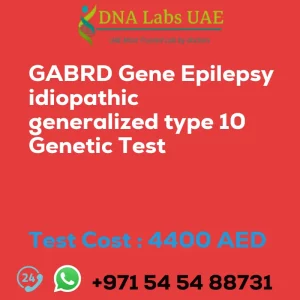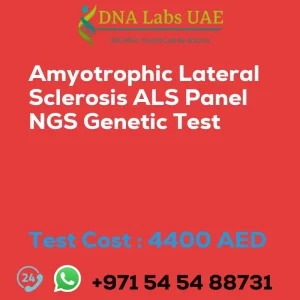FHL1 Gene Emery-Dreifuss Muscular Dystrophy Type 6 Genetic Test
At DNA Labs UAE, we offer the FHL1 Gene Emery-Dreifuss Muscular Dystrophy Type 6 Genetic Test at a cost of AED 4400.0. This test is designed to detect mutations in the FHL1 gene using Next Generation Sequencing (NGS) technology.
Test Components and Price
Test Name: FHL1 Gene Emery-Dreifuss Muscular Dystrophy Type 6 Genetic Test
Price: AED 4400.0
Sample Condition
The test can be performed on blood or extracted DNA. Alternatively, one drop of blood on an FTA Card is also accepted.
Report Delivery
Results are typically delivered within 3 to 4 weeks.
Method
The FHL1 Gene Emery-Dreifuss Muscular Dystrophy Type 6 Genetic Test utilizes NGS technology for analysis.
Test Type
This test is specifically designed for the detection of neurological disorders.
Doctor and Test Department
The test is conducted by a neurologist and falls under the Genetics department.
Pre Test Information
Before undergoing the FHL1 Gene Emery-Dreifuss Muscular Dystrophy Type 6 NGS Genetic DNA Test, it is important to provide the clinical history of the patient. Additionally, a genetic counseling session is conducted to draw a pedigree chart of family members affected by the disorder.
Test Details
The FHL1 gene Emery-Dreifuss Muscular Dystrophy Type 6 NGS genetic test is a diagnostic tool that identifies mutations in the FHL1 gene. This gene is responsible for producing a protein called four-and-a-half LIM domains 1, which plays a crucial role in muscle cell structure and function.
Emery-Dreifuss Muscular Dystrophy Type 6 is a rare genetic disorder characterized by muscle weakness and wasting, heart problems, and joint stiffness. Mutations in the FHL1 gene are known to cause this condition.
NGS technology enables the simultaneous analysis of multiple genes, making it a powerful tool for genetic testing. The FHL1 gene Emery-Dreifuss Muscular Dystrophy Type 6 NGS genetic test can detect various types of mutations, including single nucleotide variants (SNVs), small insertions and deletions (indels), and larger structural variants like deletions and duplications.
The test is typically performed on a blood or saliva sample, and results are usually available within a few weeks. A positive result indicates the presence of a mutation in the FHL1 gene, confirming a diagnosis of Emery-Dreifuss Muscular Dystrophy Type 6. This information is crucial for guiding treatment and management decisions, as well as providing important information for at-risk family members.
| Test Name | FHL1 Gene Emery-Dreifuss muscular dystrophy type 6 Genetic Test |
|---|---|
| Components | |
| Price | 4400.0 AED |
| Sample Condition | Blood or Extracted DNA or One drop Blood on FTA Card o |
| Report Delivery | 3 to 4 Weeks |
| Method | NGS Technology |
| Test type | Neurological Disorders |
| Doctor | Neurologist |
| Test Department: | Genetics |
| Pre Test Information | Clinical History of Patient who is going for FHL1 Gene Emery-Dreifuss muscular dystrophy type 6 NGS Genetic DNA Test A Genetic Counselling session to draw a pedigree chart of family members affected with FHL1 Gene Emery-Dreifuss muscular dystrophy type 6 |
| Test Details |
FHL1 gene Emery-Dreifuss muscular dystrophy type 6 NGS genetic test is a diagnostic test that uses Next Generation Sequencing (NGS) technology to detect mutations in the FHL1 gene. This gene provides instructions for making a protein called four-and-a-half LIM domains 1, which is involved in the structure and function of muscle cells. Mutations in the FHL1 gene can cause Emery-Dreifuss muscular dystrophy type 6, a rare genetic disorder that affects muscle function and can lead to muscle weakness and wasting, heart problems, and joint stiffness. NGS technology allows for the simultaneous analysis of multiple genes, making it a powerful tool for genetic testing. The FHL1 gene Emery-Dreifuss muscular dystrophy type 6 NGS genetic test can identify a wide range of mutations in the FHL1 gene, including single nucleotide variants (SNVs), small insertions and deletions (indels), and larger structural variants such as deletions and duplications. This test is typically performed on a blood or saliva sample, and results are typically available within a few weeks. A positive result indicates the presence of a mutation in the FHL1 gene, confirming a diagnosis of Emery-Dreifuss muscular dystrophy type 6. This information can help guide treatment and management decisions, as well as provide important information for family members who may be at risk of inheriting the condition. |








